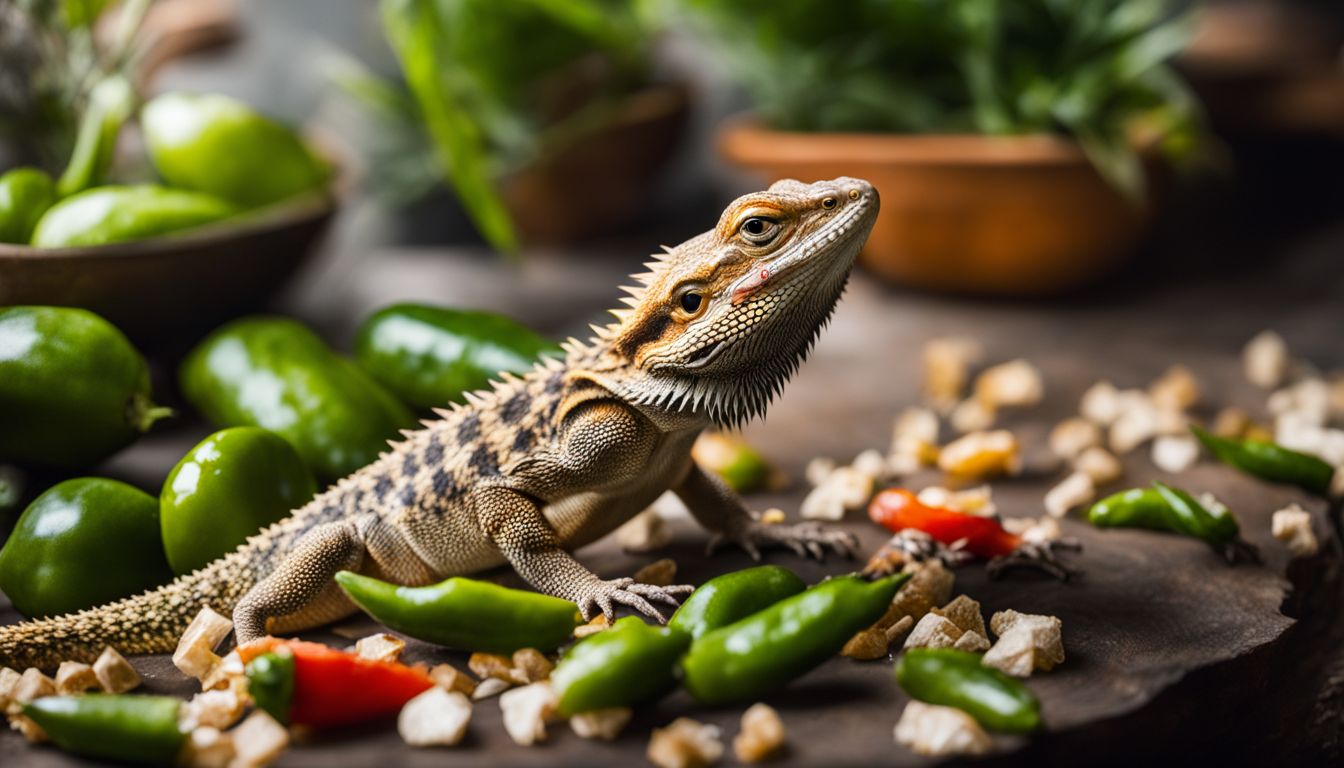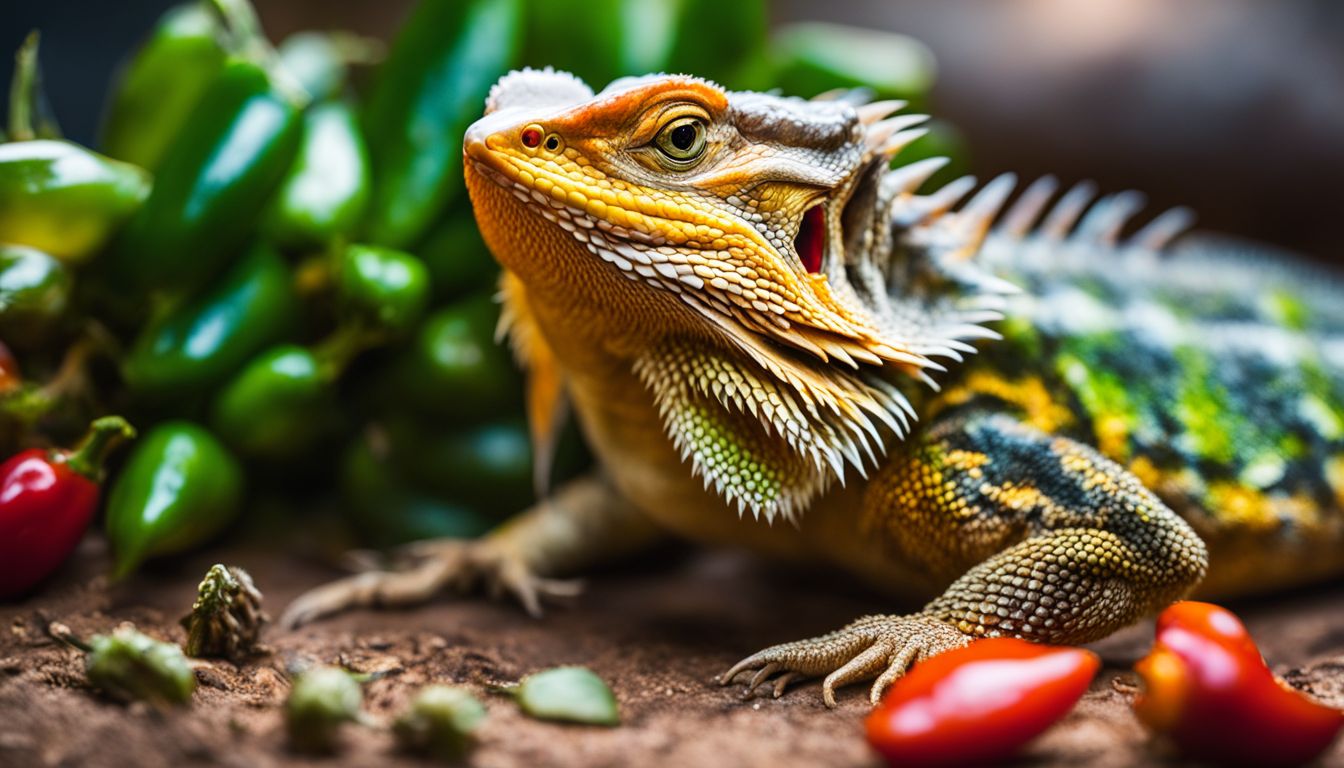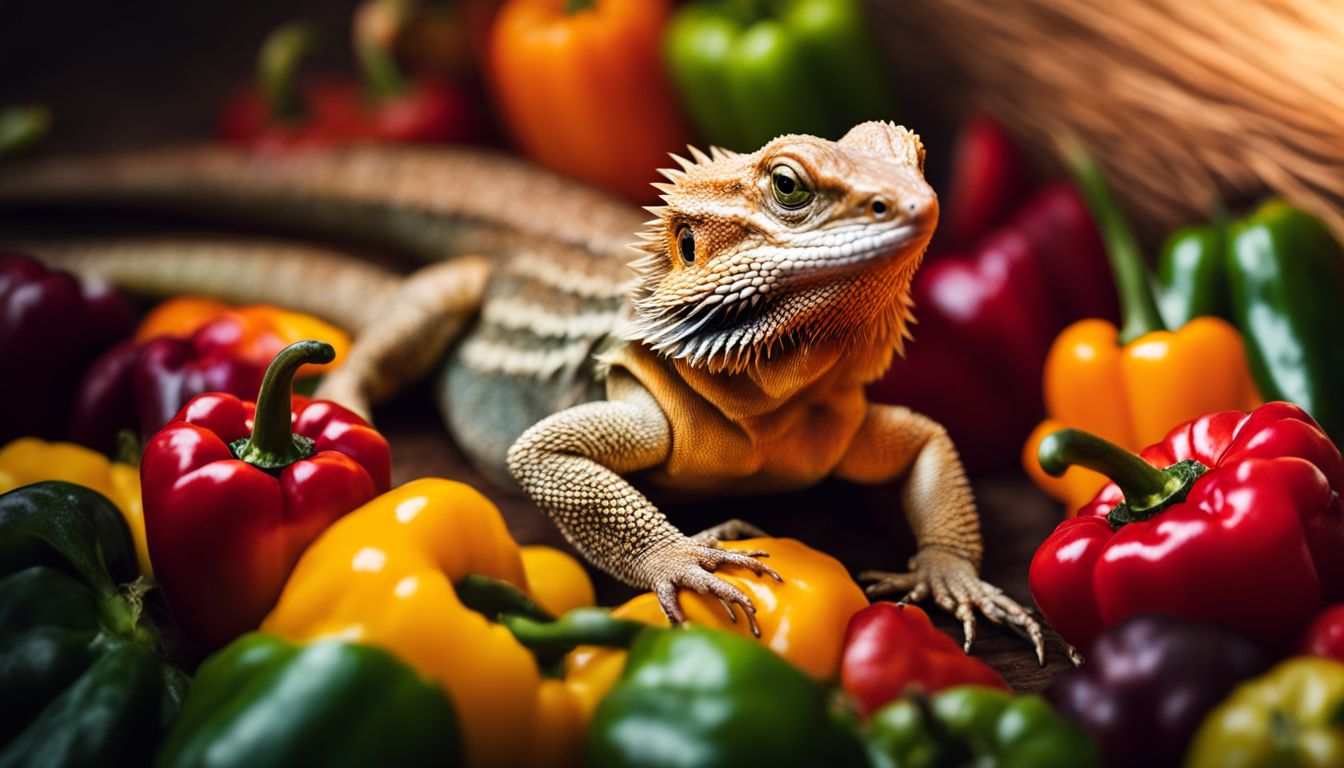Wondering if your bearded dragon can nibble on jalapenos? Here’s a quick fact: jalapenos belong to the capsicum family, which many creatures find tasty. This article will break down everything you need to know about feeding jalapenos to your scaly friend—safely and in moderation.
Keep reading for all the spicy details!
Are Jalapenos Safe for Bearded Dragons?

Jalapenos fall into the capsicum family, which bearded dragons can occasionally enjoy. These spicy peppers can stimulate their tongue’s taste buds in a unique way because of the capsaicin.
Yet, moderation is key. Feeding them small pieces of jalapenos once a month ensures they don’t suffer from digestive issues. Since these reptiles have sensitivity to capsaicin, too much could cause discomfort.
Now that we know jalapenos are safe in moderation, let’s explore how they might benefit your bearded dragon’s diet.
Benefits of Jalapenos for Bearded Dragons

Jalapenos pack a punch with capsaicin, making them a spicy treat that stimulates taste buds in bearded dragons. This unique feature excites their nerve endings, introducing a novel taste experience to their diet.
Belonging to the capsicum family, these peppers are safe and non-toxic for your scaly friend, ensuring you’re not putting their health at risk by offering them as a snack.
These spicy peppers are also rich in vitamin C—an essential antioxidant that plays a crucial role in supporting the immune system of bearded dragons. By including jalapenos in their diet, you provide them with nutritious treats that not only invigorate their taste senses but also contribute to their overall well-being.
Risks of Feeding Jalapenos to Bearded Dragons
Feeding your bearded dragon too many jalapenos can lead to significant digestive problems. These spicy peppers contain capsaicin, a compound that can upset their stomachs and cause discomfort.
Unlike humans, bearded dragons don’t have the enzyme needed to process this spicy component properly. This means even a small amount might trigger issues in their delicate digestive system.
Young bearded dragons are especially sensitive because they’re still growing and require specific nutrients that jalapenos don’t provide. Giving them spicy food like jalapenos could lead not just to digestion troubles but also impact their overall growth and health negatively.
Remember, keeping their diet balanced is crucial for avoiding these digestive issues—it’s best to save the spicy treats for very rare occasions or skip them altogether.
How Often Should Bearded Dragons Eat Jalapenos?
Bearded dragons should eat jalapenos occasionally, about once a month. Ensuring that the jalapeno pieces are small and excluding the leaves is crucial for their safety. Feeding bearded dragons large quantities or too often can cause digestive issues due to their sensitivity to capsaicin, found in spicy foods like jalapenos.
To maintain your bearded dragon’s health, it’s important to regulate their intake of this spicy treat. Offering occasional small pieces of jalapenos will keep them stimulated while avoiding potential risks associated with overfeeding.
Now let’s explore some alternative options for feeding bearded dragons besides jalapenos.
Alternatives to Jalapenos for Bearded Dragons
Consider feeding your bearded dragon leeks as a safe and nutritious alternative to jalapenos. Leeks can provide essential nutrients while being milder and easier for bearded dragons to digest.
Can Bearded Dragons Eat Leeks?
Bearded dragons can eat leeks, but only the green part, not the white. It’s essential to remove any dirt and pesticides by washing them thoroughly before feeding. Leeks should be an occasional treat in their diet due to their strong flavor and potential digestive issues.
It is important to note that while leeks are generally safe for bearded dragons if given in moderation, they shouldn’t be a regular dietary staple due to their strong taste and potential digestive disturbances.
How to Prepare Jalapenos for Bearded Dragons
To prepare jalapenos for bearded dragons, follow these steps:
- Wash the jalapenos thoroughly to remove any pesticides or dirt that may be present on the skin.
- Remove the seeds and pith from the jalapenos as they can be too spicy and difficult to digest for bearded dragons.
- Chop the jalapenos into small, bite – sized pieces to make it easier for your bearded dragon to consume.
- Offer the prepared jalapeno pieces sparingly and infrequently, ensuring they are a small part of a varied diet.
- Monitor your bearded dragon after feeding them jalapenos to ensure that they tolerate it well without any adverse reactions.
Conclusion
In summary, bearded dragons can eat small amounts of jalapenos occasionally. However, too many jalapenos may cause digestive issues due to their capsaicin content. It’s essential to monitor the dragon’s reaction and feed them in moderation.
Consider offering a variety of safe vegetables and fruits as part of their balanced diet for optimal health. Remember that maintaining a diverse diet is key to keeping your bearded dragon happy and healthy!
For more information on suitable vegetable options for your pet, check out our guide on whether bearded dragons can eat leeks.
FAQs
1. Can bearded dragons eat jalapenos?
No, it is not safe for bearded dragons to consume jalapenos due to their high spiciness and potential digestive issues.
2. What happens if my bearded dragon eats a jalapeno?
If your bearded dragon accidentally consumes a small amount of jalapeno, monitor for signs of distress such as excessive drooling or lethargy. Contact a reptile veterinarian if any concerning symptoms arise.
3. Are there any spicy foods that are safe for bearded dragons?
Bearded dragons should avoid all spicy foods, including peppers and hot sauces, as these can cause discomfort and digestive problems.
4. Can I feed my bearded dragon other types of peppers?
Mild bell peppers are safer options compared to spicy varieties like jalapenos. However, moderation is key when introducing new foods into your pet’s diet.
5. How can I ensure my bearded dragon maintains a healthy diet?
Offer a balanced diet consisting primarily of leafy greens, vegetables, fruits (in moderation), and live insects such as crickets or mealworms to ensure proper nutrition for your pet lizard.




